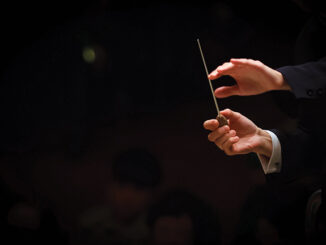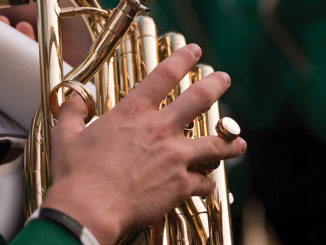
Classical music touches a universal nerve. Joy can be found in every form, including Renaissance, Baroque, Classical, Romantic and in many of the works of our time. You can still love the centuries-old beauty of Ave Maria, and the infectious gait of “Golliwog’s Cakewalk” in Debussy’s Children’s Corner. Both pieces deliver joy, and in strikingly different ways.
“I can’t help but get goosebumps when I listen to a piece like the Rachmaninoff Piano Concerto No. 2,” says writer Glynn Lyons. “The rolling piano melody and soaring string accompaniment seem to lift me out of my chair, and I feel a combination of exhilaration and peace…” For me this familiar piece brings deep joy.
A major portion of the repertoire we call “classical” abounds, overflows with happy, jubilant, joyful sounds. Fortunately, it’s always available on the radio 24/7, at WKU Classical 97.5 FM serving Bowling Green and Glasgow. But for quick musical pick-me-ups, here are a few more suggestions:
Prokofiev’s short Classical Symphony is calculated to make you smile. This exuberant work is called “Classical” because Prokofiev used the music of Haydn and Mozart as inspiration and as a template for the piece. The result is ten minutes of joy.
This prolific Russian composer also left us Marche Joyeuse (Joyful March). It is the second half of a pair of orchestral pieces. Prokofiev labeled the other composition Prelude Pastoral. If you play the accompanying, popular Joyful March, your hands and feet will not stay still.
Beethoven’s Symphony No. 6 in F is known as his Pastoral Symphony. It was first performed in 1808 as part of a four-hour concert. Beethoven was a nature lover. He would take frequent walks in the country. Whenever I hear his Symphony No. 6 I see in my mind’s eye the patch of woods adjoining my parents’ property, and hear the nearby brook roiling over the fieldstones.
Beethoven provides descriptive titles for each of the five movements of his Pastoral Symphony: (1) Awakening of cheerful feelings on arriving in the countryside; (2) Scene by the brook; (3) Merry gathering of country folk; (4) Thunderstorm and (5) Shepherd’s song: Cheerful and thankful feelings after the storm. This is a light and cheerful Beethoven from beginning to end.
Gustav Holst was a busy music teacher at St. Paul’s Girls’ School in England. He was also a prolific composer, many of his works resounding with sturdy countryside-English joy. For an example of Holst’s joyful interest in astrology, in his 1918 work The Planets, the section called Jupiter was once called by the composer “the Uplifter, because it signifies happiness, abundance and expansion, a disposition of myth; joyousness, hopeful and trustful, expectant and confident.”
EXPLORING MUSIC WITH BILL McGLAUGHLIN
Bill McGlaughlin has been on the trail of discovery since 1981when he began “Exploring Music,” a Peabody Award-winning program heard on WKU Classical 97.5 FM at 5pm weekdays. “Don’t sound like a broadcaster talking about music,” Bill was once admonished. “Sound like a musician talking about music.”
Taking that advice seriously, McGlaughlin sounds like an excited musician. He invites his listeners to join him on his daily musical explorations and share in the joy of discovery. “Exploring Music” is thematic. One week it might be exploring Vienna and its music. The next week it might be an invitation to seek forgotten musical treasures from the Baroque era. Bill invites listeners to submit exploration suggestions.
McGlaughlin is also a composer, conductor, music educator – nationally known for his cheerful, open and down-to-earth personality on classical music radio. Beyond his career as a broadcaster and music educator, McGlaughlin has also spent a decade as a conductor, and a decade as a successful composer. He views his “Exploring Music” shows as outreach – a way to “keep classical music from becoming an increasingly marginalized art form, with ever-smaller and older audiences.”
FROM THE TOP
Another effort at expanding classical music audiences is “From the Top,” heard Fridays at 11am and 6pm on WKU Classical 97.5 FM. Celebrating the stories, talents and character of young, classically-trained musicians, “From the Top” celebrates the sheer joy these mostly teen-aged kids feel in finding, studying, rehearsing and performing the music. The program is America’s largest national platform, shining the spotlight on all this young and often surprisingly accomplished talent. Through live events, NPR and video broadcasts, scholarships and education programs, “From the Top” also empowers extraordinary, gifted young people to “engage and inspire music lovers of all ages.”
May the joy of classical music help brighten your January.
-by Lee Stott
About the Author: Lee Stott is retired from WKU Public Radio, lives near Franklin with his daughter Cindy Wade’s family and has 30 grandchildren and seven great-grandchildren.







